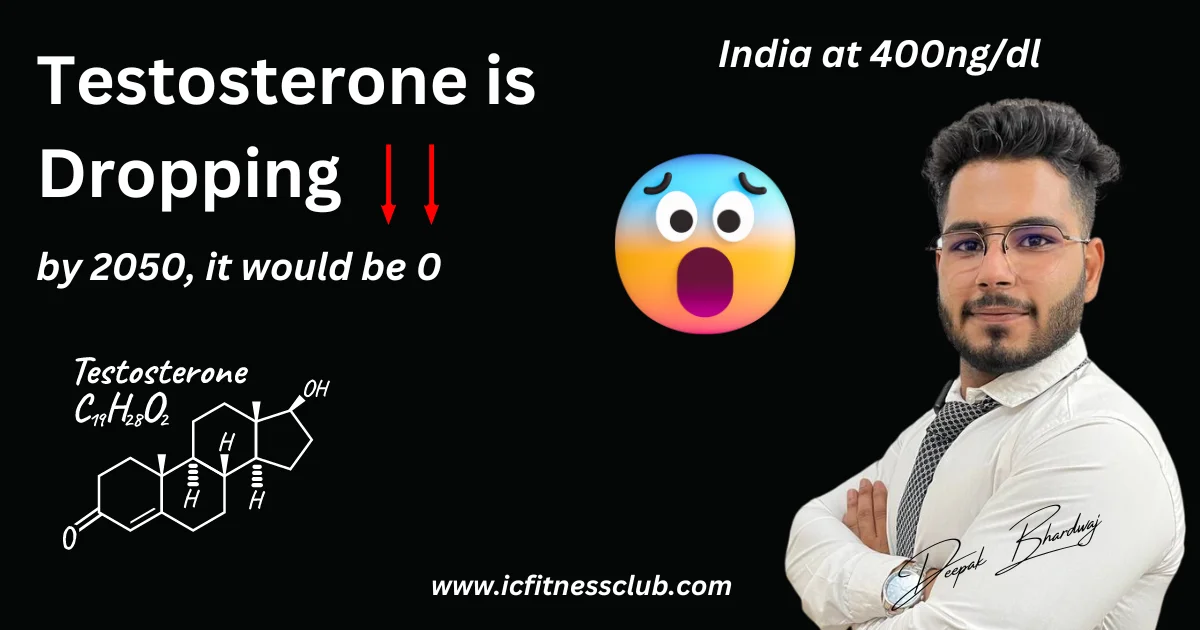The Decline of Testosterone Levels: Understanding the Factors and Implications
Introduction
In recent years, there has been growing concern about the decline in testosterone levels among men. In India, the average testosterone has dropped to 400ng/dl where Mongolia is at the top, and India is at 31st in a row. Testosterone is a vital hormone that plays a crucial role in the development and maintenance of various bodily functions, including muscle mass, bone density, libido, and overall well-being. This decline has led to numerous discussions and studies attempting to understand the factors contributing to this trend and its potential implications for health and society. In this blog post, we’ll delve into the reasons behind the decline in testosterone levels and explore the implications it might have.
Factors Contributing to Declining Testosterone Levels
- Lifestyle Changes: Modern lifestyles characterized by increased sedentary behavior, poor dietary habits, and lack of physical activity have been linked to declining testosterone levels. Excess weight, especially abdominal fat, has been shown to contribute to hormonal imbalances that lead to lower testosterone production.
- Environmental Factors: Exposure to endocrine-disrupting chemicals, commonly found in plastics, pesticides, and certain household products, can interfere with the body’s hormone regulation, potentially affecting testosterone levels.
- Stress and Sleep: Chronic stress and lack of quality sleep can disrupt the body’s hormonal balance, including testosterone production. Elevated cortisol levels, often associated with stress, can inhibit testosterone synthesis.
- Aging: Testosterone levels naturally decline with age. While this decline is a normal part of the aging process, some researchers argue that the rate of decline has been accelerating in recent decades.
- Dietary Habits: Nutritional deficiencies, such as inadequate intake of essential vitamins and minerals, can affect hormone production. For example, zinc and vitamin D are important for maintaining healthy testosterone levels.
Implications of Declining Testosterone Levels
- Physical Health: Low testosterone levels are associated with decreased muscle mass, reduced bone density, and increased risk of osteoporosis. Additionally, individuals with low testosterone may be more susceptible to weight gain and obesity-related health issues.
- Sexual Health: Testosterone plays a significant role in sexual function and libido. Low testosterone levels can lead to reduced sexual desire, erectile dysfunction, and difficulties with achieving or maintaining erections.
- Mental Health: Some studies suggest a link between low testosterone and mood disorders such as depression and anxiety. However, the relationship is complex and not fully understood.
- Fertility: Testosterone is essential for sperm production. Low levels of testosterone can lead to reduced sperm count and potential fertility issues.
- Quality of Life: Decreased energy levels, fatigue, and a general sense of malaise are often reported by individuals with low testosterone. This can impact overall quality of life and well-being.
Conclusion
The decline in testosterone levels is a multifaceted issue influenced by various factors, including lifestyle, environment, and age. While some degree of decline is normal with aging, the accelerated decline observed in recent decades raises concerns about potential health implications. Maintaining a healthy lifestyle that includes regular physical activity, balanced nutrition, stress management, and adequate sleep can help mitigate the risk of declining testosterone levels. For individuals experiencing symptoms of low testosterone, consulting a medical professional is essential to determine the best course of action, which might include lifestyle changes, hormone replacement therapy, or other interventions.
Reference
To Become a Certified Personal Trainer, Click Below




